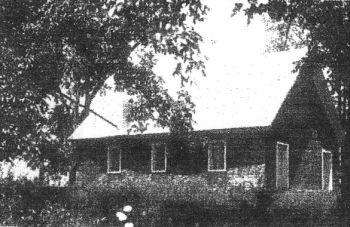 For weeks, the Civil War has been a common subject of discussion when Baptists gather on Sundays. Whether spoken of from the pulpit or in the church yard, the talk is often animated. No where is this perhaps more true than in the Border States, where loyalties are clearly split and pro-slavery and anti-slavery convictions compete to determine the future of the states as Union and Confederate forces prepare for inevitable battlefield clashes.
For weeks, the Civil War has been a common subject of discussion when Baptists gather on Sundays. Whether spoken of from the pulpit or in the church yard, the talk is often animated. No where is this perhaps more true than in the Border States, where loyalties are clearly split and pro-slavery and anti-slavery convictions compete to determine the future of the states as Union and Confederate forces prepare for inevitable battlefield clashes.
In Cane Springs, Kentucky (Madison County) – south of Lexington and near the home of well-known abolitionist Cassisus M. Clay – the Old Cane Springs Baptist Church gathers today, the first Sunday of the month of May. A young man new to the community, Augustine “Gustin” Hart, in attendance this Sunday, records today’s events at the Old Cane Springs church:
“Old Cane Springs appeared to be a God-fearing and God-loving community. There was preaching at the Cane Spring Church as usual. Rev. William Rupard, a young Baptist preacher from Clark County, had been engaged as minister. The first Sunday in May was expected to be a big day, and the usual preparations were made to entertain those attending who might live at a distance. Lambs, pigs, and chickens had been slaughtered by the dozens, and when the congregation began to assemble, it was evident that no unnecessary preparation had been made.
In a very short time the church was filled with ladies, except the ‘amen corner’ and the extreme rear of the church. The yard was about as full as the church. Men gathered in various parts of the yard, and as one passed among them he heard nothing but war and preparation for war being discussed. One group was vigorously discussing the Clay battalion’s recent defense of the White House and the Navy Yard in Washington. Since Cassius M. Clay was a citizen of Madison County, his singular action was especially interesting. The opposing views of the North and South were freely advocated and it was evident that the peace-loving and law-abiding citizens of Old Cane Springs and vicinity were ready to take up arms in defense of one or the other of the sections.
When the services were over, those who had heard the sermon came out either lauding or condemning the preacher, who had spoken of the people of the South as Rebels, bent on dissolving the Union of the States. His utterances on this point were soon known by the crowd on the outside, some of whom received them with condemnation while others approved; and excitement ran high. One man said in a loud voice, ‘No more of his preaching for me. No true preacher knows anything in his pulpit but Christ and Him crucified.’
Most all of the members who owned slaves were grievously offended at the preacher’s remarks. Major C. F. Burnam, an attorney from Richmond, who was present, congratulated the preacher on his defense of the Union. His statement, however, was overheard and caused him to be condemned as much as the preacher.
Finally the crowd began to disperse. It was noticed that Rupard and Burnam were still in the yard. When most everyone had left Captain Noland went up to them and remarked: ‘If you gentlemen do not hurry, I fear you will be late in getting your dinner.’
Rupard said, ‘I have been here at other times when I received many invitations, but I must confess no one has invited me today.’
Major Burnam stated that he had been coming to the May meeting at Cane Springs ever since he had united with the church, and that he had eulogized the hospitality of this community above any other of the county; but now he, too, had been overlooked by his brethren.
‘Exciting times! Exciting times!’ exclaimed the Captain. ‘I am sure it was unintentional and you must both go home with me.’
Captain Noland soon learned that he had incurred the ill will of his neighbors for inviting Major Burnam and the preacher to his home. Men of the community were fast taking sides and excitement ran high. Those with much property and many slaves sympathized with the South, while most of those with small homes and no slaves were for the North.”
This description of the day’s events at Old Cane Springs Baptist Church encapsulates the tension of the times in Kentucky, as well as the socio-economic fault line over slavery in much of the South throughout the war years.
Source: Old Cane Springs – A Story of the War Between the States in Madison County, Kentucky, revised edition by J. T. Dorris, 1936, pp. 62-63.
Note: Special thanks to Jim Duvall of the BaptistHistoryHomepage website for this account of the Old Cane Baptist Church, both text and photo, scanned and transcribed from the above source. More information about the church is available here on the BaptistHistoryHomepage site.


